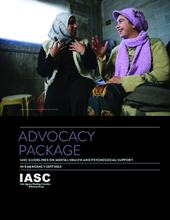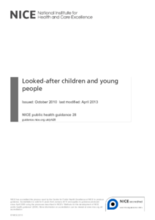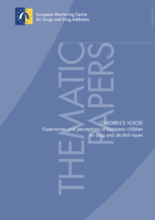Displaying 441 - 450 of 526
Foster youth in the US do not appear to be receiving many forms of help that are called for in federal law. Over one-third did not receive help they would have liked to have received. System factors play a stronger role than individual indicators of need in help receipt. Independent living services should be more widely available and better targeted.
This paper explores the research evidence from England and France on the mental health of young people aging out of care and into adulthood.
This informational note for action, produced by World Day of Prayer and Action for Children, aims to support religious communities and partners in promoting “positive parenting” and non-violent disciplining of children.
Este informe presenta detalles de talleres para favorecer el desarrollo y adquisición de conocimientos, habilidades y destrezas para lograr una adecuada intervención psicosocial en las poblaciones afectadas por el terremoto/maremoto.
The first ever World report on disability, produced jointly by WHO and the World Bank, suggests that more than a billion people in the world today experience disability. This report provides the best available evidence about what works to overcome barriers to health care, rehabilitation, education, employment, and support services, and to create the environments which will enable people with disabilities to flourish. The report ends with a concrete set of recommended actions for governments and their partners.
This Advocacy Package explains what the IASC guidelines are and how they are to be used, highlights the key campaigning activities, key messages for communities, donors, UN Agencies and Non-Governmental organisations, clarifies terminology and provide ideas for country level implementation.
This manual offers a training session targeted at policy makers, professionals and paraprofessionals who are already working on programs to support children without appropriate care, or who may begin work in this area. This workshop focuses on children in developing contexts, who require support within their families and those who need an alternative care placement.
The aim of this guidance is to improve quality of life of looked-after children and young people in England, including their physical health, and social, educational and emotional wellbeing. It focuses on and encourages organisations, professionals and carers to work together to deliver high quality care, stable placements and nurturing relationships for looked-after children and young people.
The purpose of this paper is to give meaning and insight into some of the key drug and alcohol issues that affect children from the perspectives of the children themselves. Research shows that large numbers of children who are separated from their parents are particularly vulnerable to developing drug and alcohol problems. Special attention is paid throughout the report on children looked after by relatives, foster carers, and institutions.
Call for greater political and financial commitment to help build parents’ capacity to care for their children and to tackle the poverty and social exclusion that underlie many of the problems experienced by children and their families.







